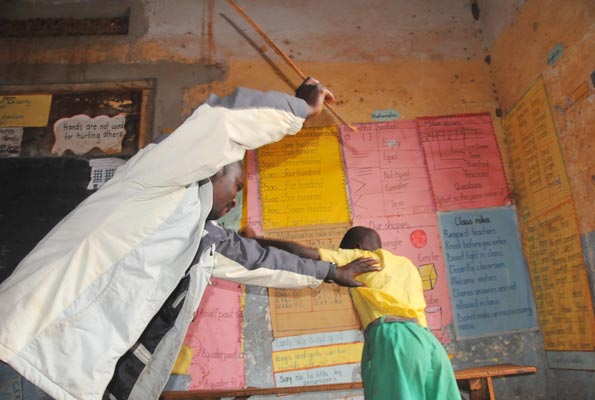On January 24, 2018, Uganda Martyrs University held its Annual Research Conference.
Prof John Opuda-Asibo, the executive director of the National Council for Higher Education, was the guest speaker. He talked at length about research ideals, but also, in his characteristic frankness, threw in one inconvenient truth after another: about lecturer, student, and management flaws in our universities.
His presentation sent me into reflection about the different kinds of teachers I passed through, those I have worked with, and my own practice.
Certainly, we cannot characterise all our teachers in one particular way. There are differences at nursery, primary, secondary, and tertiary levels – even within each level.
Nevertheless, by and large, there are elements about ‘the teacher’ that seem to feature in most of our schools. Back in my primary school days, if you asked any pupil to draw a teacher, it had to be someone carrying a stick. This school-based terrorism has since reduced, but in many schools the teacher counterproductively continues to be a fear figure.
Indeed, teachers need to command authority to be able to nurture, guide and instruct those in their charge. But we tend to mistake ‘being feared’ for ‘being respected’.
Thus the school space turns into some sort of prison or barracks with power relations that make mutual engagement and learning difficult.
There are many reasons why some teachers create an environment of fear around them. For some, it is out of personal insecurities and a feeling of inadequacy. Be wary of the teacher who is not sure about what they are teaching, they tend to be very angry, paranoid, and hostile.
Even an innocent question asked in attempt to understand is interpreted as a challenge to their knowledge and authority.
In class, they create a tense atmosphere where students would fear asking questions – or else they face his/her wrath.
They could create this atmosphere by always wearing a mean look or denigrating/ridiculing those who dare ask, especially hard questions.
Unfortunately, these battles in bizarre defence of the teacher’s misconstrued authority are sometimes taken to the marking front, where those perceived to be challengers are ‘tamed’ or gotten back at by being under-marked. We thus create an awkward system where teachers cannot be challenged – even when they are blatantly wrong.
At university, it is not uncommon to find students that read ahead of the teacher – and quite common where some teachers hardly read.
I have heard cases where students complain about lazy lecturers that will mainly rely on Wikipedia and they come to class to dictate lousy notes gathered from the site. No student is expected to speak to the teacher against this injustice, except if they are ready to fail!
Thus, the captive class sits in to painfully watch the teacher waste their time. Discussion is thwarted, debate is foiled, and the culture of questioning is killed. This is how we end up rolling out products that can’t think independently, can’t question things, and fearful of working on their own.
This phenomenon is not helped by the widely-prevalent tendency in most of our cultures to conflate respect with fear. Many of our children are raised in fear.
Their innocent questions are answered with barking or being silenced. Questioning an elder’s view, even in politeness, is taken for disrespect. In some cultures, it is restrictively referred to as ‘looking an elder in the mouth’. So, it is fear at home, fear at school – no discussion, only being told what to do!
In their critical book titled Teaching As A Subversive Activity, Neil Postman and Charles Weingartner note that “there can be no significant innovation in education that does not have at its centre the attitudes of teachers, and it is an illusion to think otherwise.
The beliefs, feelings, and assumptions of teachers are the air of a learning environment; they determine the quality of life within it. When the air is polluted, the student is poisoned, unless, of course, he [she] holds his [her] breath”.
In a façade akin to what Paulo Freire (in Pedagogy of the Oppressed) called the ‘Banking concept of education’, the classroom is mistakenly perceived by many of our teachers to be a space where they are supposed to prove their knowledge of everything while the students’ role is to take in. Thus, even where they are ignorant, some teachers would rather tell a lie than admit that they don’t know!
In this mistaken approach, as Freire observes, “knowledge is a gift bestowed by those who consider themselves knowledgeable [teachers] upon those whom they consider to know nothing [students].
Projecting an absolute ignorance onto others, a characteristic of the ideology of oppression, negates education and knowledge as processes of inquiry. The teacher presents himself to his students as their necessary opposite; by considering their ignorance absolute, he justifies his own existence”.
Moreover, whether the teacher is talking sense or not, it is not the students’ business. Like in any other dictatorship, the omniscient teacher reserves the exclusive right to determine how the class is run.
Little wonder then that a lecturer can shamelessly spend half of the lecture telling the helpless class about his/her achievements! ‘I’m a professor. Do you know what it takes to become a professor?
I have visited twenty countries attending workshops and conferences. I am a rich man. I own a farm in Nakaseke. My son is at St Henry’s College Kitovu’. Stuff totally unrelated to the course, not even for illustration or student motivation!
Sometimes the students who quietly sit through this abuse of classroom space have even achieved much more in life than what the lecturer finds important to parade before them.
The author heads the Centre for African Studies at Uganda Martyrs University, Nkozi.
This post was created with our nice and easy submission form. Create your post!






